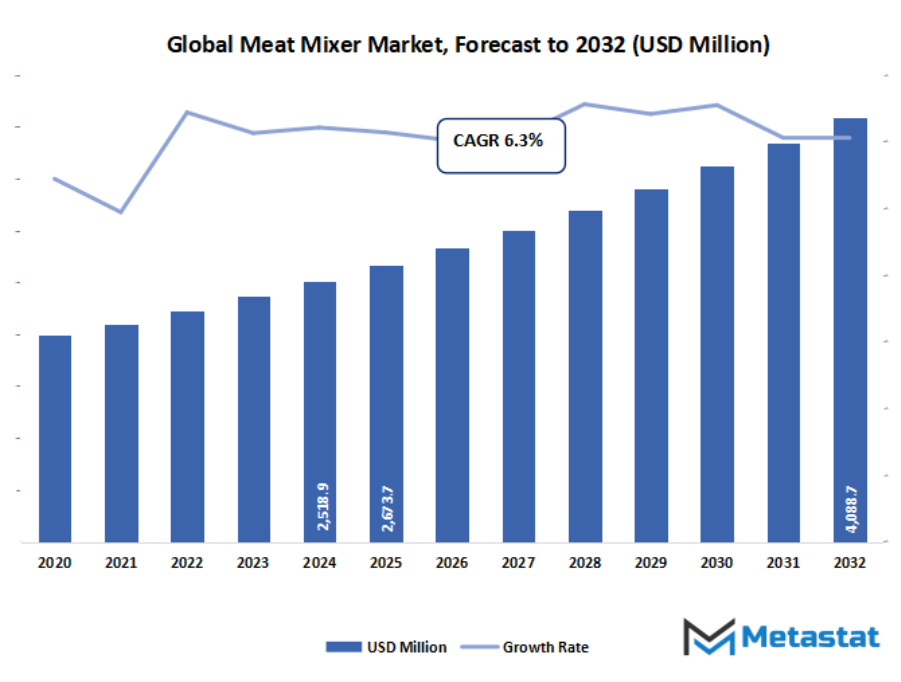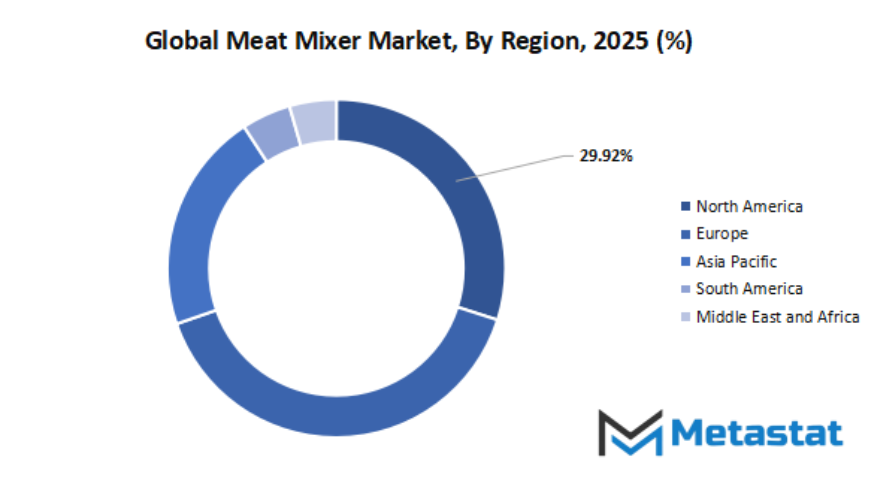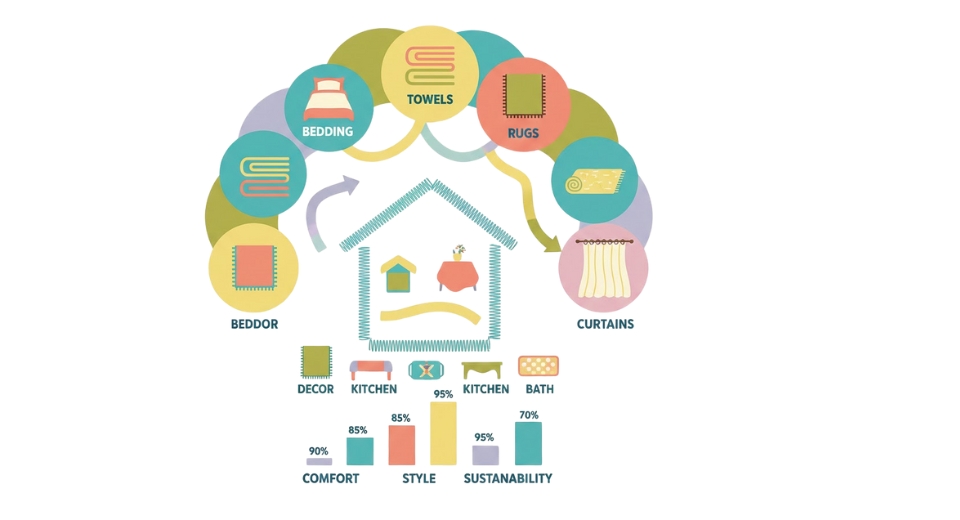Global Meat Mixer Market - Comprehensive Data-Driven Market Analysis & Strategic Outlook
The global meat mixer market will amplify past its conventional barriers as the enterprise maintains to discover innovation and redefine efficiency in food processing. Traditionally identified for mixing meat and seasonings to achieve uniform texture and flavor, this marketplace will evolve into a space that merges advanced era with sustainable practices. The focus will flow toward equipment that now not only complements productivity but additionally keeps the dietary and sensory qualities of meat merchandise. As food producers strive for consistency and hygiene, the marketplace will emphasize automation and clever systems capable of coping with large-scale production with precision.
- Global meat mixer market valued at approximately USD 2673.7 million in 2025, growing at a CAGR of around 6.3% through 2032, with potential to exceed USD 4088.7 million.
- Automatic Meat Mixers account for nearly 34.2% market revenues, driving innovation and expanding applications through intense research.
- Key trends driving growth: Rising demand for processed and convenience meat products globally., Increasing adoption of mechanized meat processing in food industries.
- Opportunities include Growing trend of ready-to-eat and frozen meat products boosting demand for automated mixers.
- Key insight: The market is set to grow exponentially in value over the next decade, highlighting significant growth opportunities.

Can the global meat mixer market redefine performance and consistency in huge-scale meat processing as automation and smart technology maintain to boost, or will conventional blending methods still maintain their ground? How will transferring patron alternatives toward plant-based options have an effect on the marketplace’s destiny route, and can innovation sustain its momentum amidst developing sustainability concerns?
In the approaching years, the global meat mixer market will not definitely cater to business needs however turns into a reflection of converting consumer behavior and regulatory expectancies. Equipment designers will prioritize consumer-friendly interfaces, strength performance, and easy sanitation, allowing agencies to decrease waste at the same time as improving operational manage. The collaboration among mechanical engineering and food science will form a technology of mixers that adapt to various product sorts—whether for processed meats, plant-primarily based alternatives, or hybrid products that blend traditional and contemporary meals choices.
Market Segmentation Analysis
The global meat mixer market is mainly classified based on Product Type, Application, End User.
By Product Type is further segmented into:
- Automatic Meat Mixers
The global meat mixer market will experience incredible increase within the section of computerized meat mixers due to rising technological integration in food processing. Automation will ensure consistent mixing, reduced labor dependency, and more suitable manufacturing speed. With growing international call for for processed meat, automated systems will benefit higher adoption across industries for performance and hygiene.
- Manual Meat Mixers
Manual meat mixers will continue to serve smaller operations and neighborhood meat producers inside the market. Their affordability and ease will lead them to appropriate for groups with restricted manufacturing requirements. Despite automation trends, guide mixers will maintain significance in regions wherein guide hard work stays fee-effective and desired.
- Countertop Meat Mixers
The countertop section within the market will make bigger step by step, particularly among small-scale food shops and households. Compact size, ease of cleaning, and comfort will encourage adoption. Growing hobby in home made and freshly mixed meat products will push consumers to invest in countertop alternatives for personalized practise.
- Industrial Meat Mixers
Industrial meat mixers will dominate the global meat mixer market due to growing demand for large-scale meat processing facilities. These heavy-obligation structures will play a essential function in producing uniform batches of meat for sausages, patties, and other processed ingredients. Future designs will focus on hygiene manage, automation, and strength-green operations to support sustainable processing.
By Application the market is divided into:
- Commercial Meat Processing
The business meat processing section of the global meat mixer market will extend with the growing need for bulk meat guidance across global meals chains. As intake of prepared-to-cook meat objects keeps to upward thrust, advanced mixing device will become critical to retaining product uniformity and safety at industrial degrees.
- Retail Meat Processing
Retail meat processors within the market will increasingly more adopt mixers for element manipulate, custom designed seasoning, and brief turnaround. Retailers will depend upon mid-sized mixers to cater to customer demand for sparkling and flavored meat merchandise, ensuring consistency and minimizing manual managing.
- Home Use
In the market, home use will see consistent boom pushed by using the upward thrust of domestic chefs and kitchen innovation. Consumers will choose compact and smooth-to-use mixers for growing customized meat blends. Enhanced designs focusing on comfort, safety, and affordability will attract family consumers worldwide.
- Industrial Meat Manufacturing
Industrial meat manufacturing will keep a substantial part of the global meat mixer market. Large meat manufacturing devices will make use of superior mixers to meet high-extent needs at the same time as maintaining strict hygiene standards. Future tendencies will desire strength-green and automated systems capable of mixing numerous meat kinds to ensure worldwide scalability.
By End User the market is further divided into:
- Meat Processing Plants
Meat processing flowers will stay the most important give up users in the global meat mixer market. Continuous modernization of production facilities and strict meals protection policies will increase funding in high-capacity mixers. Such systems will streamline blending methods, enhancing each texture and high-quality across diverse meat products.
- Supermarkets and Retail Stores
Supermarkets and retail shops will play a growing function inside the market as they awareness on in-house meat practise. Installing compact mixers will permit on-website processing, imparting purchasers more energizing options. This fashion will enhance customer accept as true with whilst making sure superior meat excellent and longer shelf existence.
- Food Service Providers
Food service providers, including eating places and catering organizations, will contribute drastically to the market. Consistent first-class and taste may be completed through efficient blending equipment. As the worldwide eating industry expands, reliable and hygienic meat mixers becomes essential for huge-scale meals guidance.
- Households
Households will form an rising section inside the global meat mixer market, encouraged by means of the growing reputation of DIY cooking and meat customization. Compact and consumer-pleasant designs will drive usage in domestic kitchens. Increasing customer focus concerning meals hygiene and control over elements will further raise household adoption.
|
Forecast Period |
2025-2032 |
|
Market Size in 2025 |
$2673.7 Million |
|
Market Size by 2032 |
$4088.7 Million |
|
Growth Rate from 2025 to 2032 |
6.3% |
|
Base Year |
2024 |
|
Regions Covered |
North America, Europe, Asia-Pacific, South America, Middle East & Africa |
Geographic Dynamics
Based on geography, the global meat mixer market is divided into North America, Europe, Asia-Pacific, South America, and Middle East & Africa. North America is further divided in the U.S., Canada, and Mexico, whereas Europe consists of the UK, Germany, France, Italy, and Rest of Europe. Asia-Pacific is segmented into India, China, Japan, South Korea, and Rest of Asia-Pacific. The South America region includes Brazil, Argentina, and the Rest of South America, while the Middle East & Africa is categorized into GCC Countries, Egypt, South Africa, and Rest of Middle East & Africa.

Competitive Landscape & Strategic Insights
The global meat mixer market offered through Metastat Insight reflects a growing and aggressive landscape that connects innovation with practicality. The marketplace’s structure is fashioned through each mounted worldwide producers and emerging nearby producers who constantly bring sparkling thoughts to the desk. Meat mixers are vital gadget across food processing facilities, helping reap consistency, hygiene, and efficiency in manufacturing. As client expectancies for processed meat products boom, the demand for advanced meat blending solutions will maintain to upward thrust, encouraging businesses to consciousness on automation, safety, and strength performance.
Within this expanding enterprise, a various set of gamers function to fulfill varied market desires. Leading agencies such as Metos, ABM Company, Groupe PSV, Industrial Fuerpla, and OMET FOODTECH SRL have set up their presence through reliability and strong distribution networks. At the identical time, regional gamers like Storm Engineering, Mainca USA, and Swedlinghaus are strengthening their market percentage by way of imparting specialised designs tailored to neighborhood processing standards. This stability among international giants and agile rookies guarantees that the enterprise stays dynamic and responsive to changing meals production developments.
Product excellent and operational innovation play a chief position in setting those organizations apart. Well-regarded producers inclusive of Cato, Lakidis, and MINERVA OMEGA GROUP focus on constructing long lasting machines which could handle high-extent operations with precision. Meanwhile, manufacturers like ASGO, Fatosa, and Unity Engineering are making an investment in sustainable production methods and progressed product safety capabilities, on the way to enchantment to clients seeking out long-time period reliability. The integration of clever technology, which includes automatic manage structures and real-time overall performance monitoring, is regularly remodeling conventional meat processing techniques into greater efficient and cost-effective operations.
Another exciting element of this marketplace is how nearby preferences and production styles influence product development. Companies like Dadaux SAS, Ari Makina, and LEM Products are responding to the precise needs of small and medium-sized meat manufacturers who require compact, smooth-to-smooth, and power-green mixers. This range permits the market to serve both large-scale industrial plant life and neighborhood butchers alike, creating a balance between technological development and accessibility.
Market Risks & Opportunities
Restraints & Challenges:
- High preliminary investment value of superior meat mixers. The global meat mixer market will face obstacles due to the high in advance costs connected with advanced mixing device. Modern meat mixers would require complicated era and durable components that increase the general expense for manufacturers. Small and medium-sized businesses will find it difficult to manage to pay for such equipment, slowing the adoption rate. Additionally, common maintenance and enhancements will add to operational fees, growing financial strain. This will limit many manufacturers from modernizing their manufacturing lines notwithstanding the efficiency blessings these machines will provide.
- Strict food safety and hygiene policies in distinctive areas. The global meat mixer market will come upon demanding situations from diverse meals protection and hygiene regulations across areas. Each usa could have unique requirements for meat processing, making it difficult for producers to meet a couple of compliance requirements. The production method would require normal system sanitization and advanced cleaning structures to save you infection. Failure to conform will lead to consequences or bans, affecting worldwide alternate prospects. Manufacturers will want to invest closely in certification, checking out, and regulatory modifications, increasing both price and complexity.
Opportunities:
- Growing trend of equipped-to-consume and frozen meat products boosting call for for automatic mixers. The global meat mixer market will witness enlargement due to growing patron choice for ready-to-eat and frozen meat gadgets. Urbanization and busy lifestyles will create a regular call for for processed meat that is simple to put together and store. Automated meat mixers will decorate manufacturing speed, ensure uniform mixing.
Forecast & Future Outlook
- Short-Term (1–2 Years): Recovery from COVID-19 disruptions with renewed testing demand as healthcare providers emphasize metabolic risk monitoring.
- Mid-Term (3–5 Years): Greater automation and multiplex assay adoption improve throughput and cost efficiency, increasing clinical adoption.
- Long-Term (6–10 Years): Potential integration into routine metabolic screening programs globally, supported by replacement of conventional tests with advanced biomarker panels.
Market size is forecast to rise from USD 2673.7 million in 2025 to over USD 4088.7 million by 2032. Meat Mixer will maintain dominance but face growing competition from emerging formats.
Moreover, the enterprise will witness an expanded integration of records-pushed insights, permitting manufacturers to pleasant-tune their strategies in real-time. This shift will turn mixers into analytical equipment in preference to mere processing gadgets. The global meat mixer market will ultimately constitute the future of meals coaching era, where precision, sustainability, and innovation coexist to meet each commercial and client needs.
Report Coverage
This research report categorizes the global meat mixer market based on various segments and regions, forecasts revenue growth, and analyzes trends in each submarket. The report analyses the key growth drivers, opportunities, and challenges influencing the global meat mixer market. Recent market developments and competitive strategies such as expansion, type launch, development, partnership, merger, and acquisition have been included to draw the competitive landscape in the market. The report strategically identifies and profiles the key market players and analyses their core competencies in each sub-segment of the global meat mixer market.
Meat Mixer Market Key Segments:
By Product Type
- Automatic Meat Mixers
- Manual Meat Mixers
- Countertop Meat Mixers
- Industrial Meat Mixers
By Application
- Commercial Meat Processing
- Retail Meat Processing
- Home Use
- Industrial Meat Manufacturing
By End User
- Meat Processing Plants
- Supermarkets and Retail Stores
- Food Service Providers
- Households
Key Global Meat Mixer Industry Players
- Metos
- ABM Company
- Groupe PSV
- Industrial Fuerpla
- OMET FOODTECH SRL
- Storm Engineering
- Mainca USA
- Swedlinghaus
- Cato
- Lakidis
- MINERVA OMEGA GROUP
- ASGO
- Fatosa
- Unity Engineering
- Dadaux SASAri Makina
- LEM Products
WHAT REPORT PROVIDES
- Full in-depth analysis of the parent Industry
- Important changes in market and its dynamics
- Segmentation details of the market
- Former, on-going, and projected market analysis in terms of volume and value
- Assessment of niche industry developments
- Market share analysis
- Key strategies of major players
- Emerging segments and regional growth potential








 US: +1 3023308252
US: +1 3023308252






